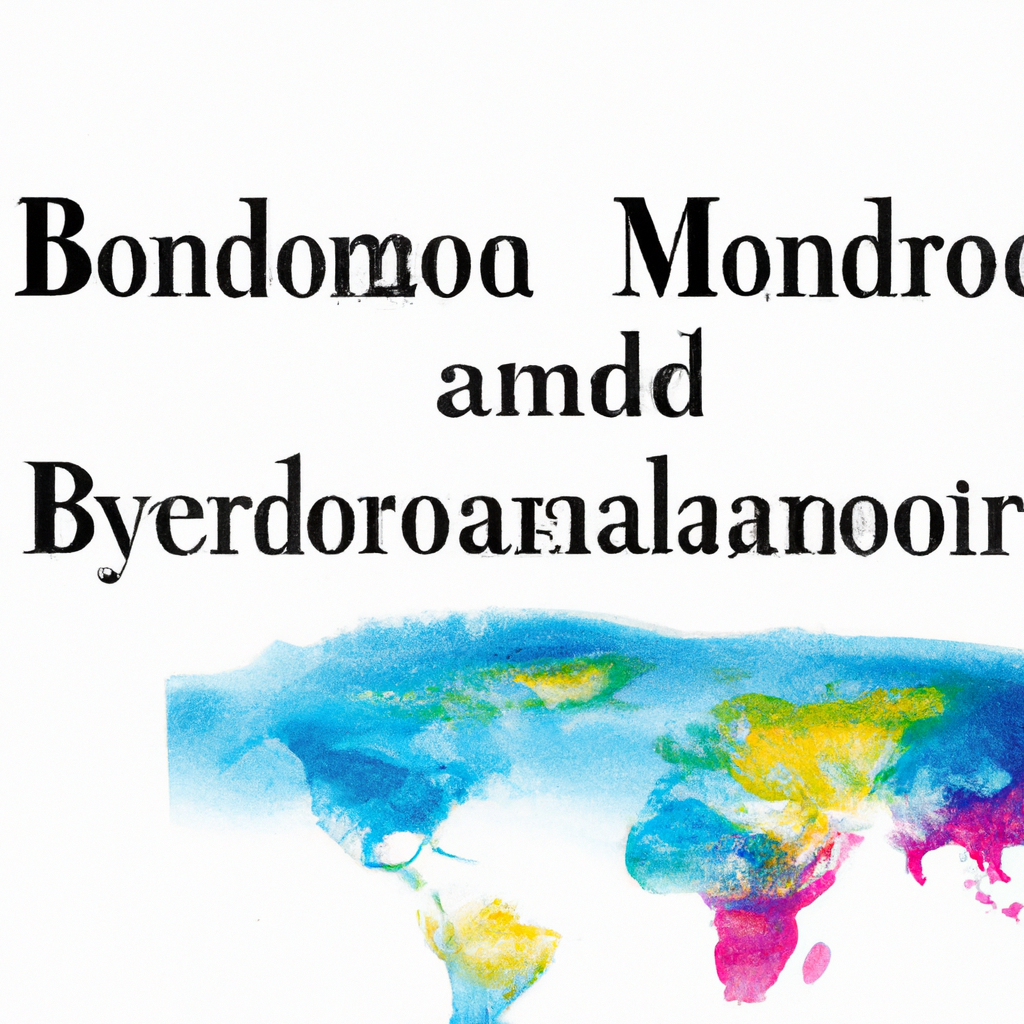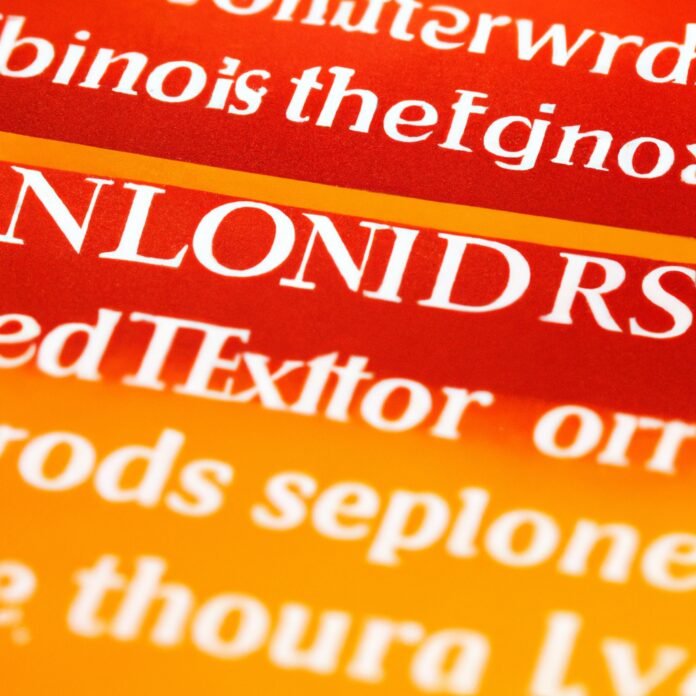This is the age of globalization, and with it comes a heightened awareness of our increasingly interconnected world. In the 21st century, boundaries are becoming increasingly porous and the global population is growing ever more multilingual. Language has become an invaluable tool not only for communication, but to bridge divides of culture, race, and religion. But what does the future of multilingualism look like? In our latest article, we explore the implications, opportunities, and dynamics of ‘beyond borders’ tomorrow’s multilingualism.
1. Bridging the Gap: Tomorrow’s Multilingualism
As the 21st century marches forward, the world is becoming increasingly interconnected. With a single click, a person’s voice can be heard around the world. More and more people are beginning to learn multiple languages on their own, forming an international community, and connecting with others from different backgrounds, cultures, and nations without ever leaving home.
The internet and digital technology are enabling the spread of languages, cultures, and customs, providing people with unprecedented access to a range of multilingual resources. In the past, multilingualism was mostly the domain of those with the financial means to travel and study abroad. But now, distance learning, virtual classrooms, and language exchange programs are making it easier for everyone to learn multiple languages without ever leaving their homes.
Multilingualism is no longer a privilege, but an essential part of our dynamic global economy. Companies that employ multilingual workers have more access to new markets, customers, and resources. In addition, people who are multilingual have an advantage in today’s job market. This means that employers can recruit a range of highly-skilled talent from around the world, and individuals can pursue their career paths in a variety of multilingual countries.
What’s more, learning multiple languages has a range of other benefits. People who are multilingual are better communicators, and better able to build lasting cross-cultural relationships and empathy for people from different backgrounds. It also helps people learn more about other cultures, values, and worldviews, enabling them to develop new insights and ideas.
The Future of Multilingualism
- More multimedia language learning tools are being developed to help people learn new languages more easily and quickly.
- Language exchange programs are becoming more popular and accessible.
- Organizations are increasingly interested in hiring employees with multiple language skills.
- Multilingualism is becoming a fundamental part of everyday life.
As the world gets smaller and more connected, people are becoming increasingly aware of the benefits of a multilingual environment. Now is the time for people to embrace multilingualism and take advantage of the opportunities it offers. By doing so, they can bridge the gap and help build a world in which all languages and cultures are celebrated.

2. The Power of Language: Exploring the Benefits of Multilingualism
The power of language is undeniable. Whether we realize it or not, the words we use to communicate convey meaning, evoke emotions, and have a huge impact on our lives. But when it comes to mastering multiple tongues—or even just a few—the benefits reach far beyond the surface level. Beyond adding an interesting new skillset to your résumé, multilingualism offers a plethora of advantages, which can open doors to a world of opportunities.
From an early age, it is important for children to develop an understanding and appreciation of different cultures, religions, and beliefs. Learning another language gives young people a window into other cultures, allowing them to become more open-minded, tolerant, and accepting of different ways of life.
Another great benefit of speaking multiple languages is the ability to pick up new cultural references. As a multilingual person, you’ll be immersed in different environments, introducing you to customs, jokes, and trends from different countries—which can make you even more interesting as an individual.
The advantages of being multilingual extend beyond the social realm. Professionally, being able to speak multiple languages makes you stand out, as many jobs require you to speak more than one tongue. By having exposure to different languages, you also become more aware of the nuances of language and how to communicate most effectively in many contexts.
Finally, learning a language can be a great way to exercise your brain and challenge it in ways that it’s not used to. Becoming familiar with a new language can help expand your knowledge and sharpen your cognitive skills, as you learn to think in different ways.
Whether you choose to take up a new language for social, personal, or professional reasons, studying and speaking it will certainly have a positive impact on your life. By harnessing the power of language, you can experience new adventures, broaden your cultural horizons, and find success and satisfaction in your life.
3. Harnessing the Potential: Unlocking a World of Opportunity
Since the dawn of modern technology, mankind has opened up a world of opportunity and exploration unlike anything before. Our ever-advancing capabilities to create have enabled us to travel to the furthest depths of space, explore the deepest oceans, and connect to people from different walks of life in an instant. With this power, the potential for global harmony and an ever-growing, equitable world awaits us. So, how can we harness the potential to unlock a world of opportunity?
Take Positive Action: People need to take positive action in order to achieve the goals required to unleash the power of potential. This action requires people to take responsibility and display responsibility when tackling different projects. People should get involved in activities that benefit the environment, equip people with new skills, and create an environment where everyone feels included in what is being accomplished.
Embrace New Technologies: Our world is rapidly changing, with new technologies popping up every day. These technologies can open up incredible, yet sometimes intimidating, opportunities. It’s important to embrace them when they prove useful to an individual or group. This can be anything from artificial intelligence to blockchain. These technologies can help reduce barriers to entry and create new career opportunities.
Involve the Community: Next, it’s important to get the local community involved in the effort to unlock a world of opportunities. This can mean anything from organizing events to help equip people with skills, raising funds for conservation projects, or creating networks of people around the world to share knowledge and ideas. This is the essence of a global community and allows individuals to access an ever-growing pool of opportunities.
Utilize Resources: Finally, it’s important to make use of all the resources that are available. There are countless programs, grants, scholarships, and conferences that exist to help individuals, organizations, and communities to unlock a world of potential. Taking advantage of these resources is essential to help foster a better global community.
Overall, harnessing the potential to unlock a world of opportunity requires people to take positive action, embrace new technologies, involve their community, and make use of available resources. Only then can a lasting, equitable, and global harmony be achieved.
4. Taking Multilingualism to the Next Level: The Future of International Communication
As the world becomes more interconnected, international communication is increasingly becoming a necessity. With the development of digital technologies, communication has become more accessible and easier to understand. The development of multilingualism has been one of the most influential aspects of this technological transformation. New tools and applications have enabled people to communicate in different languages and to communicate across cultures and countries.
The benefits of multilingualism have become increasingly evident, and it has become a major factor in international business and diplomacy. Companies are now hiring people who can speak multiple languages, enabling them to expand into new markets and increase their global reach. Governments are also taking advantage of multilingualism to better understand and collaborate with partners from different nations.
The future of international communication will depend on the progress of multilingualism. Technology has already made it easier to communicate in different languages, but it is still not perfect. We need to continue to develop effective solutions that allow people to communicate and understand each other in multiple languages. To do this, we must look beyond traditional language learning and explore new technologies such as machine-learning and artificial intelligence.
We also need to develop better ways of integrating existing tools and applications. For example, advances in natural language processing can enable us to create more accurate translations and develop more intuitive interfaces that make it easier for people to understand each other.
Finally, we need to continue to promote cross-cultural understanding and appreciation. We need to create more opportunities for people to exchange ideas, engage in meaningful conversations, and form new relationships. Multilingualism is a powerful tool for achieving this, but it must continue to evolve to meet the needs of a more interconnected world.
The world of tomorrow is a place of global connection and understanding — a place where multilingualism can not only be embraced but celebrated as well. With greater access to global languages comes an opportunity to transcend borders and forge a path to a more tolerant, more conscientious future. Let’s learn to see ourselves in others, no matter the language we speak. There is a whole world out there waiting to be explored. Let’s take the leap and see where it will take us.
